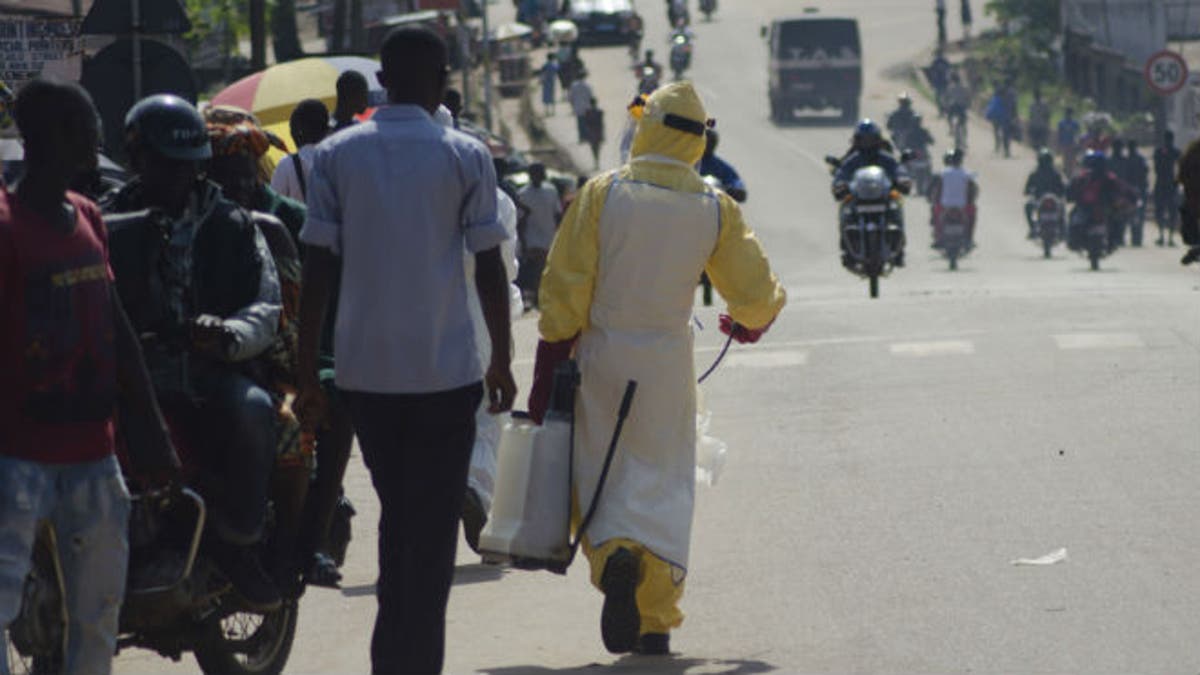
A health worker with disinfectant spray walks down a street outside the government hospital in Kenema, July 10, 2014. (REUTERS/TOMMY TRENCHARD)
Sierra Leone officials appealed for help on Friday to trace the first known resident in the capital with Ebola whose family forcibly removed her from a Freetown hospital after testing positive for the deadly disease.
Radio stations in Freetown, a city of around 1 million inhabitants, broadcast the appeal on Friday to locate a woman who tested positive for the disease that has killed 660 people across Guinea, Liberia and Sierra Leone since an outbreak was first identified in February.
"Saudatu Koroma of 25 Old Railway Line, Brima Lane, Wellington," the announcement said. "She is a positive case and her being out there is a risk to all. We need the public to help us locate her."
Koroma, 32, a resident of the densely populated Wellington neighborhood, had been admitted to an isolation ward while blood samples were tested for the virus, Health ministry spokesman Sidi Yahya Tunis. The results came back on Thursday.
"The family of the patient stormed the hospital and forcefully removed her and took her away," Tunis said. "We are searching for her."
Fighting one of the world's deadliest diseases is straining the region's weak health systems, while a lack of information and suspicion of medical staff has led many to shun treatment.
DOZENS UNACCOUNTED FOR
Earlier this year, a man in Freetown tested positive for Ebola although he is believed to have caught it elsewhere.
According to health ministry data and officials, dozens of people confirmed by laboratory tests to have Ebola are now unaccounted for in Sierra Leone, where the majority of cases have been recorded in the country's east.
While international medical organizations have deployed experts to the field in an attempt to contain the outbreak, the World Health Organisation (WHO) said poor health infrastructure and a lack of manpower were hindering their efforts.
"We're seeing many of these facilities simply don't have enough people to provide the constant level of care needed," WHO spokesman Paul Garwood told a news briefing in Geneva on Friday.
There is no cure or vaccine for Ebola, which causes diarrhea, vomiting and internal and external bleeding. It can kill up to 90 percent of those infected, although the mortality rate of the current outbreak is around 60 percent.
The West African outbreak is the first time that Ebola, which was first discovered in what is now Democratic Republic of Congo in 1976, has appeared in heavily populated urban areas and international travel hubs.
Cases have already been confirmed in Conakry and Monrovia, the capital cities of Guinea and Liberia.
On Thursday authorities in Nigeria announced that they were testing a Liberian man for Ebola after he collapsed upon arrival at an airport in Lagos, the country's commercial capital and a mega-city of 21 million people.
